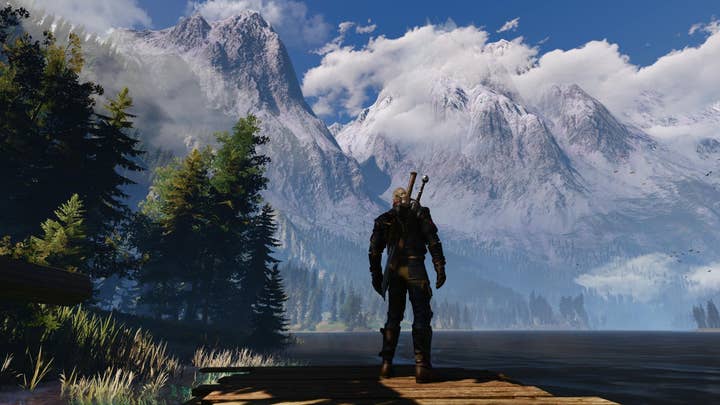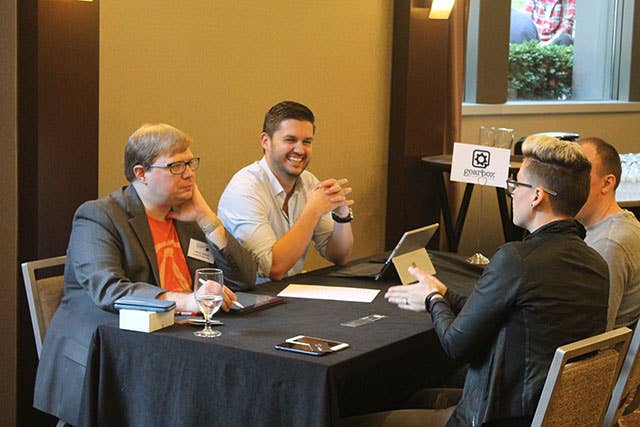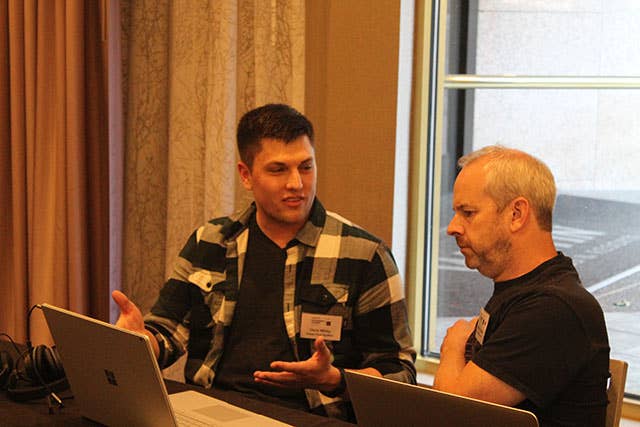How to guarantee your pitch will be rejected
Publishers and investors share advice on the common mistakes to avoid in your presentation when you're pitching
There is an abundance of advice on how to pitch your game to investors and publishers -- including on this very website. But it's less common to find advice on what not to do.
In a How To Pitch session during our recent Investment Summit Online, a member of the audience asked: "What are the instant red flags that automatically lead you to reject a pitch?"
Sadly, there wasn't time to answer this during the session, so the GamesIndustry.biz Academy reached out to a variety of publishers and investors to find out what quickly dissuades them from working with a developer. Here are the biggest red flags they identified.
Lack of a clear selling point
This is the big one. Attempting to capitalise on the success of established games often leads publishers and investors to question whether a new title is strong enough to stand up on its own. In fact, Sold Out CEO Garry Williams says pitches that boil down to "[insert popular game] meets [insert popular game]" can make the listener almost immediately switch off.
"Because then we already know that you're chasing trends and your game will most likely be vacuous and artificial," he says. "It's obviously important to be aware of what's successful and draw those comparisons when pitching for ease of understanding, but they're has to be something about your game that's special beyond those comparisons. Audiences know the difference between a meaningful iteration of ideas and something cynically manufactured in the mould of past success."

Team17 CEO Debbie Bestwick adds: "No one sets out to make a bad game, but making something unique in such a competitive landscape is difficult. More than ever developers need to pitch the concept earlier if looking for funding. There's nothing worse for any team to be working in secret for a year or two, only to turn up with a pitch for a game that is not unique in a crowded genre. We can help provide this feedback at pitch stages and also do early stage funding to help prove the vision."
No More Robots founder Mike Rose also warns against pointing to the specific success of popular games as a metric for how well your own game will perform.
"When pitches list half a dozen massive games in their genre, and say: 'They all sold one million copies, so we expect to sell roughly one million copies as well,' that tells me that you have the completely wrong expectations of how well your game could actually do," he says. "Which means you're going to be impossible to work with. It also shows me you've done zero research into how games are actually selling. I swear, if one more person says 'Limbo sold two million units, so can we,' I will lose my mind."
John Polson, publishing portfolio director at Humble, also warns that companies can easily spot a "trend follower without key differentiation." He offers the huge influx of Metroidvanias pitched in recent years as an example. That's not to say developers should avoid this genre, but if that's what you want to make, Polson advices looking closer at the games already available, how they've raised the quality bar compared to your game, and how many other teams are going after the same audience.
He adds: "Maybe pivot and take some of your design DNA and inject that in a new sub-genre you create or that is lacking on the platform you are targeting. Now you have the potential to be a trendsetter."
You haven't done your research
"Either you can't count, or you're trying to fuck someone. If it's the latter, I really hope you accidentally put an extra 0 in there by mistake"
Johan Toresson, Raw Fury
Multiple publishers say they often get pitches that don't fit with their portfolio, especially since so many indie publishers specialise in a particular genre or style of game.
Chris Wright, managing director at narrative games publisher Fellow Traveller, reports his team still receives pitches for hyper casual mobile games, multiplayer brawlers and other games that are completely out of touch with the type of titles they publish.
He says: "It tells us right away that the developer did zero research into us before pitching and if they take no care in pitching, how much care will they take with the game or in the relationship? We're always more interested in reading a pitch when it's clear the developer has done their homework and has chosen to pitch to us specifically."
Hiro Capital founding managing partner Luke Alvarez says the same applies to investors, and particularly venture capital firms. Bringing a creative vision and artwork but not including a business plan is not of interest. Alvarez and his team are looking for people with the vision and ambition to create something large.
"It's rare to find the ideal combination of creative chops and business vision, but when you do it is very exciting," he adds.
Game Dragons' co-founder Philip Oliver adds that it quickly becomes obvious when "people appear to blag answers, rather than relying on research, facts and projections."
Unrealistic scope
Wright says another big red flag is when the scope of the game does not meet the experience of the team. Working to a big budget, or even having a large team of very new developers is "usually an instant pass."
However, Nichiporchik notes that sometimes publishers may be able to help with this, depending on the project.
"It's easy to say you can build an RPG at The Witcher's scale, yet actually planning out the content pipeline to make it not a five-year, 50-person team project can sometimes be difficult," he says. "This is usually when our production team works with the dev teams to figure out an approach that requires less 'physical content' -- props, quests, scenes, etc -- and instead focuses on either user-generated content or systems-based designs, where you treat the game as a platform rather than a linear story."

Unrealistic budget
This can range from pitching a budget that's unrealistically low or way beyond what's reasonable will instantly raise a publisher's suspicions.
"If the developer did zero research into us and take no care in pitching, how much care will they take with the game or in the relationship?"
Chris Wright, Fellow Traveller
"Either you can't count, or you're trying to fuck someone," says Toresson. "If it's the former, we can work out a budget that's fair and which will support the team properly. If it's the latter, I really hope you accidentally put an extra 0 in there by mistake."
Raw Fury co-founder David Martinez adds that an unrealistic budget also tells publishers that a team has not properly thought through what it needs to complete the game in terms of time, resources, staff and so on.
"Sometimes this mismatch of budget expectations is due to inexperience, and we're glad to help them figure this out, but we have to be sure the reason is not because a dev team is drastically cutting down their budget to look more attractive to a publisher," he says. "I'd argue that doesn't matter anyway."
Sold Out's Williams assures developers that publishers "do not expect producers or accountants" to deliver the pitch, but an unwillingness to understand the implications of the project "speaks ill of your capacity to work well with people of different disciplines."
Unrealistic valuations
On a similar note, inflating or misrepresenting the value of your company can also be a red flag. Team17's Bestwick reminds developers that "people are buying tomorrow's success, not yesterday's." Of course, there can be exceptions if you have significant forward-looking revenues from existing franchises or back catalogue titles.
"Valuation needs to be based on current and future earnings alongside goodwill," Bestwick continues. "All too often, any party looking for investment or a sale will share their best years with the following few years' earnings to get maximum valuation. There's nothing wrong with this but it's vital they can show solid reasoning behind the numbers. No guess work please."
Oliver adss that investors can also be deterred if there's no prediction at all regarding what an investment might be worth in the future. This can make it seem like the developer is "just asking for money to dig them out, without any concept of what's in it for the investor."

Modus Games CEO Christina Seelye emphasises that, in addition to budget, developers need to be realistic about how long their game will take to develop.
"When we see a studio have a lack of understanding of the timelines required or the related budget for their expected timelines, that's a big red flag," she says. "If they've left out user experience testing or not allowed time for sufficient QA, testing, and polishing, we can see that they either don't have the experience needed or they don't care about quality."
Sharing too much information
This perhaps applies more to publishers than investors, but it's important to carefully consider what you include in your pitch. Too much information, especially granular details that are incidental to the overall project, can be overwhelming and actually harm your pitch.
"I don't want 20 pages of concept art, a double spread detailing the deep lore of your game, and five long paragraphs on how you found the inspiration for the game," says Rose.
"It's the same concept when people say 'keep your CV short and sweet, to two pages' -- you want to condense all the good stuff down into a manageable chunk, otherwise the real details that I'm looking for are going to get lost. Keep it short. Sell me the game. Tell me what you need from us. Include a video or two. That'll do it."
Lack of information and clarify
That said, developers should not hold back in that all-important first pitch. Raw Fury's Toresson says that any confusion over what the developers are actually making, or pitches that "don't correlate to what I've been playing" can also be worrying for publishers.
"It's easy to say you can build an RPG at The Witcher's scale, yet actually planning out the content pipeline can be difficult"
Alex Nichiporchik, TinyBuild
Wright adds that, at a time when there are no physical events to meet and pitch at, it's important to include everything your potential partner needs in the first email. He says it's a red flag if that email makes it hard to understand what a game is about because the studio is asking for Non-Disclosure Agreement before sharing any more information. It's also unwise to put vague paragraphs in the email but keep the rest of the pitch behind a link.
"We get a lot of pitch emails so if a team makes it hard to understand their pitch, we'll probably ignore it," he says. "Related to that, if we can't find anything about the developers or the project online, it can be a negative factor. We tend to sign games that have at least some public presence.
Rose adds that sending the pitch straight away, rather than asking permission is also vital.
"I can't tell you how many times a day I get the following email: 'Hello, we want to pitch our game to you, is this the right place to do it, and what exactly do you need us to send to you?'. It drives me mad. When you ask 'can I pitch to you?,' you're putting an entire extra step between you and getting your pitch to the person. Just send it, and send all the obvious stuff -- what the game is, a video of it in motion, what you need from the publisher, a build if you have one."
Which leads us onto...
No build, video or mechanics
It's vital that publishers and investors get the best feel for what your game is -- and the optimal way to achieve that is to let them play it. A playable build, even a rough vertical slice, will explain more than a swanky PowerPoint presentation ever could.
Sold Out's Williams says he's usually wary of pitches that centre around visuals, but don't mention mechanics or systems: "This isn't an immediate dismissal, but it will raise concern. Great art is hard work, but it's something that can be resolved later in development and bringing in outside help.
"Mechanics and systems are the foundation of the game though, and if this isn't working, then the whole thing will collapse. We need to see a prototype accompanied with some game design planning to get a sense of how sturdy that foundation is."
TinyBuild's Nichiporchik adds: "If the pitch is mostly an idea, a presentation but there's nothing to show off visually or gameplay wise, [it's a worry]. Even if it's super early, you can still show off the 'game feel' or make a fake trailer to give an idea of what you're going for."
The CEO also notes that it's a big technical risk for developers to use a custom engine, especially when it comes to ports to consoles and mobile.

Lack of dedication to the creative vision
There's a balance to be struck when it comes to holding true to your vision of the game and being open to publisher and investor suggestions. While Game Dragon's Oliver notes that "people who don't listen to advice" are an instant red flag, it's crucial that you take the lead on your own project and don't expect publishers or investors to fill in the blanks for you.
Wright explains: "Something that always raises concerns is when the developer tells us in the pitch that they will happily change the concept or design in a particular direction depending on what we think would be best. We like to work with developers who are keen to listen to feedback and respect our value as a partner but we also want them to be confident and have a strong vision for the game. The creative drive should always come from the developer."
While you should look out for the mistakes mentioned here, it's important to remember that the pitch is just the beginning of your journey towards a potential partnership. While documents and slide decks need to be clear and succinct, for example, publishers are aware that some developers are "not super versed in writing pitches." That in itself is not an instant turn-off for companies, providing there's something promising in that presentation.
"The pitch is the starting point for discussion - not the end of it," Toresson concludes. "Honestly, there's a 50/50 chance that I might just interpret what you've typed up wrong, due to language barriers or tons of other reasons for something to look off. But if it's a solid experience and you've done the homework -- i.e. Googled how to pitch to us and made sure the material is in the pitch -- then we can probably figure out the stuff that's off."

